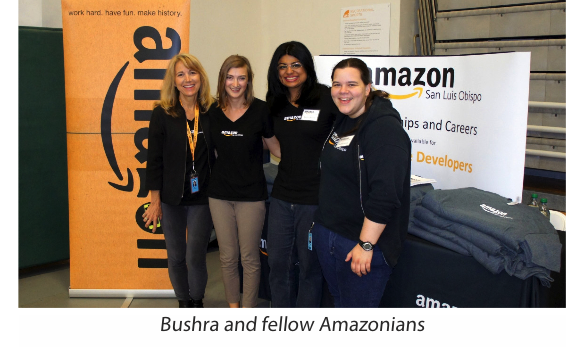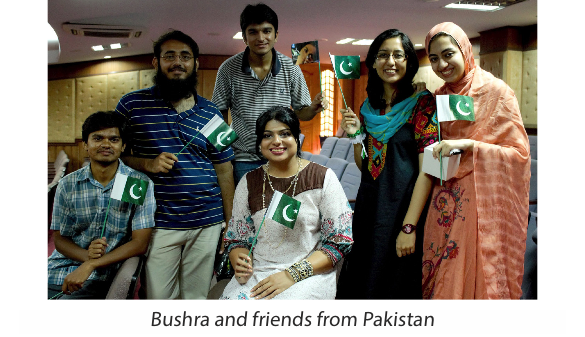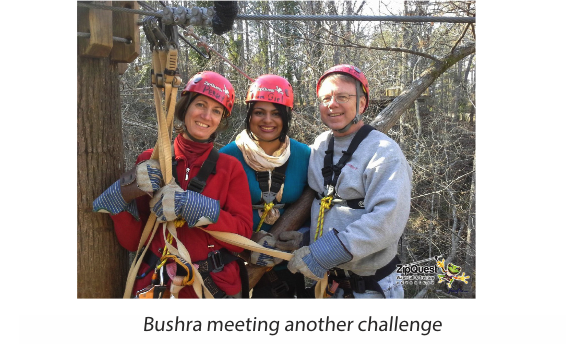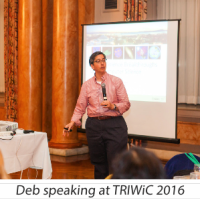Highlight on Alum Bushra Anjum
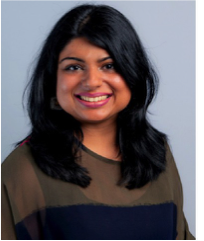 Dr. Bushra Anjum is a 2012 CRA-W Graduate Cohort Alumna, and is currently a software and research engineer at Amazon, Inc in San Luis Obispo. She has expertise in Agile Software Development for large scale distributed systems with special emphasis on system design and development for highly-scalable, fault-tolerant systems. Originally a Fulbright scholar from Pakistan, Dr. Anjum has international teaching and mentoring experience and served in academia for five years before joining industry. She worked at the Missouri University of Science & Technology as an Assistant Teaching Professor and took the lead on underrepresented and female students’ recruitment and retention, securing funding from CRA-W/CDC to host a Distinguished Lecture Series. Before that she served as an Assistant Professor at the Computer Science department of National University of Computer & Emerging Sciences, Lahore, Pakistan. She received a B.Sc. degree in Computer Science in 2005, Summa Cum Laude, from National University of Computer and Emerging Sciences, Pakistan. She received her M.Sc. degree in Computer Science in 2007, maintaining rank 1 in a batch of 250 students and earning the gold medal, from Lahore University of Management Sciences, Pakistan. She completed the Ph.D. degree in Computer Science from North Carolina State University (NCSU) in 2012, advised by IEEE Fellow Dr. Harry Perros. She also completed a one year Certificate of Accomplishment in Teaching Curriculum.
Dr. Bushra Anjum is a 2012 CRA-W Graduate Cohort Alumna, and is currently a software and research engineer at Amazon, Inc in San Luis Obispo. She has expertise in Agile Software Development for large scale distributed systems with special emphasis on system design and development for highly-scalable, fault-tolerant systems. Originally a Fulbright scholar from Pakistan, Dr. Anjum has international teaching and mentoring experience and served in academia for five years before joining industry. She worked at the Missouri University of Science & Technology as an Assistant Teaching Professor and took the lead on underrepresented and female students’ recruitment and retention, securing funding from CRA-W/CDC to host a Distinguished Lecture Series. Before that she served as an Assistant Professor at the Computer Science department of National University of Computer & Emerging Sciences, Lahore, Pakistan. She received a B.Sc. degree in Computer Science in 2005, Summa Cum Laude, from National University of Computer and Emerging Sciences, Pakistan. She received her M.Sc. degree in Computer Science in 2007, maintaining rank 1 in a batch of 250 students and earning the gold medal, from Lahore University of Management Sciences, Pakistan. She completed the Ph.D. degree in Computer Science from North Carolina State University (NCSU) in 2012, advised by IEEE Fellow Dr. Harry Perros. She also completed a one year Certificate of Accomplishment in Teaching Curriculum.
Dr. Anjum represents Pakistan at the GlobalTechWomen organization and is an advocate of diversity and female participation in STEM. She currently volunteers and is a mentor at ACM MentorNet, ABI Educational Advisory Board, Empowering Leadership Alliance, LeanIn.org, Computing beyond the Double Blind’s Mentoring Network and The Citizens Foundation. She has authored scholarly papers in the areas of Performance Evaluation and Quality of Service (QoS) Prediction/Provisioning for Networks, Data Science and Big Data Analytics.
Q: What has been your path that brought you to this point in your career? What made you choose a career in industry? I was born and raised in Pakistan and did my undergrad and master’s from there. In 2007 I came to the US on a Fulbright Scholarship for a PhD and completed the degree from NC State University in 2012. After that I was associated with academia and taught at the university level both in Pakistan and here. My research background is in Performance Evaluation and Queueing Theory, primarily focused on mathematical modelling and simulation analysis of systems. Six months ago, I joined Amazon as a senior engineer with the Amazon Prime team.
I love teaching and interacting with students. However, I realized that in computer science academia at many places is lagging behind industry and not keeping up with the blazing speed at which our industry is evolving and innovating, especially over the past 10 years. Undergraduate computer science courses are being taught by individuals who have had no or very limited industry exposure and here, I believe, lies the problem. For advanced research oriented courses and degrees, certainly we need experienced researchers to take the lead, but for undergraduate foundation and skill building courses, we need people with exposure and ties with industry. I have a PhD and an active research record and enjoy teaching advanced courses, but my heart lies in teaching undergraduate first and second year Computer Science courses. That has been my driving factor to get to industry. I want to learn and give back.
Q: In your current position at Amazon, what are your goals and the opportunities to make an impact? What attracted you to this position? When I decided to join industry, there were many great companies to consider. What won me to Amazon is the massive scale at which the company operates and its constant obsession with superior customer experience. I have been an Amazon Prime customer for many years and as a consumer, absolutely love the service. Hence, when an opportunity came up to be a part of that team, I was extremely interested to see how things work from the other side. The excursion has been fascinating! I am part of the team which is responsible for maintaining Prime memberships and ensuring their accurate, timely and reliable integration with the accounting systems. The work that we do impacts millions of customers on a daily basis, and that is an incredibly empowering yet humbling feeling.
Q: Would you rather be liked or respected? I hope one day women do not have to make that choice, but perhaps we have not reached that point yet. I would, without a doubt, choose to be respected. As I see things, respect emanates from the strength of your character, consistency of conduct and principles. It is something that you yourself define and own. Likability, on the other hand, is conformity to the expectations and values of another person. It’s a reflection process that you neither define nor own and if you continue on this path for long, there is a high probability that you will lose yourself completely in the quest to be liked. Also, in my experience, genuine respect does lead to liking in due time.
Q: What challenges have you had to overcome as a woman leader in the field? What is the most difficult aspect of your career right now? The same challenge that every other women in tech faces, i.e., the dichotomy of dual expectations. Dr. Deborah Gruenfeld (social psychologist and professor at Stanford Business School) defines this beautifully as playing High, which means you show your authority, power and influence, and playing Low, which means you are more approachable and likable. As leaders in tech we are expected to play high but as women we are traditionally expected to play low. So when we play high, we are deemed not likeable and when we play low, we are deemed not competent! It’s a continuous balancing act. Patience and good judgement have been my friends in this journey.
Q: Tell us who inspires you and the knowledge they have imparted. My father! I have learned from him how to truly empower women. We are three sisters, I am the youngest one, and our father not only did not clip our wings in a society notoriously known for doing it but also nurtured us to take expansive flights. His dream was to see his daughters well educated, financially independent and socially productive. And he has achieved it with my eldest sister a medical doctor working in the UK, the other one an MBA and a senior executive in Pakistan and myself a senior engineer at Amazon. His words of encouragement as we were growing up are my constant source of strength, even today. I would like to share a few here:
“You are not my or anyone else’s property.”
“Go ahead with it, we will see what happens.”
“I am very proud of you.”
“These are the risks, but it is your decision. I will support you, no matter which way you go.“
“I trust your judgement.”
Q: How have you been involved in CRA-W? What has this involvement meant to you? I first came to know about CRA-W when I stopped by their booth at the Tapia Conference in 2011 as a third year grad student. I grabbed a few of the flyers and one of those announced CRA-W Grad Cohort 2012. I liked the premise of grad students interacting with successful women in the field and seeking practical advice. I applied for the program, secured a scholarship and attended the Cohort in Bellevue, WA 2012. Needless to say it was an inspirational experience.
Later I joined Missouri University of Science & Technology (MST) as an Assistant Professor and was in charge of outreach activities. One of my first initiatives was to bring the CRA-W Distinguished Lecture Series (DLS) to campus. With DLS, I was able to host Dr. Bhavani Thuraisingham, Executive Director of the Cyber Security Research Center at UT Dallas and Dr. Patricia Lopez, Platform Applications Engineer at Intel Corporation in 2014. The students loved the opportunity to interact with prominent faculty and industry researchers and the event brought encouragement to women and minority students to pursue research in computer science and engineering.
Currently I am at Amazon, and this year I took the CRA-W Grad Cohort program to Amazon’s PR department and made a case for sponsoring the cohort. I am delighted that I was able to convince them and Amazon is now a Bronze Sponsor for CRA-W Grad Cohort 2016. I am also speaking at the Cohort. From attending as a grad student in 2012 to arranging corporate sponsorship in 2016, my association with CRA-W has only grown and become stronger. Not to mention that I have made many wonderful friends in the CRA and CRA-W community.
Q: Let’s talk about something fun. If you were an animated character, who would you be and why? Oh this is easy, that will be Olaf! He truly is my alter-ego. I am a hugger, I take pleasure in the simple things in life and can find humor in any situation. I am also a friend who will be there through thick and thin and a romantic! Oh, and did I mention I am highly accident prone?
Q: Tell us about the special skills you bring to your career, as an immigrant from Pakistan. How does this perspective inform your work? I am a completely different person, I would like to think a much better person, than I would have been if I had only lived in Pakistan or the USA all my life. Not only have I lived in these two countries, which are at opposite ends of the spectrum in many aspects, but I have also lived in various different parts of these two countries and have witnessed the diversity within. This national and international exposure has both broadened my outlook and improved my emotional quotient. I find that I am able to leverage this emotional awareness into effective time management, stress tolerance, anger management, presentation skills, decision making, and communication to name a few critical skills. My colleagues have often acknowledged my ability to be much more emotionally aware of my surroundings than people usually are and for contributing positively to the overall team and work environment.
Three learnings that constantly guide me in my personal and professional life are:
- The things that we have in common are far more important than the things that divide us.
- Sticking with familiar may be tempting, but is extremely dangerous.
- A stereotype may not be necessarily wrong, but it is always incomplete and if we are not conscious and careful, it unfairly and unintentionally makes one story become the only story.
Do you consider yourself a ‘feminist’? A feminist is any person, male or female, who believes in the social, political and economic equality of the sexes. Yes I am a feminist and so should every other person be in the 21st century.
How do you define success and how do you measure up to your own definition? My criteria is quite simple. Whenever you look at yourself in the mirror, you should feel like you are looking at a friend and are not tempted to throw a vase at the reflection. Now I do understand that on some days, bad hair or a horrific shade of lipstick may make us do that, but it should not be the feeling of contempt, disdain or discomfort. And yes, I am good friends with myself and hence do consider myself successful.
Do you have any advice for women at any stage of their careers? I would like to share two of my rules that have helped me steer my life and career positively. First, learn to let go the fear of making a mistake. Learn to avoid the paralysis by analysis trap. Time box your analysis, give weight to your instincts and learn to take the leap of faith. Second, understand that most of our judgments of others are our own ego strategies to avoid uncomfortable feelings. Whenever you find yourself judging someone, please stop for a second and introspect as you have just identified an ego-wrapped hidden area of self improvement.

